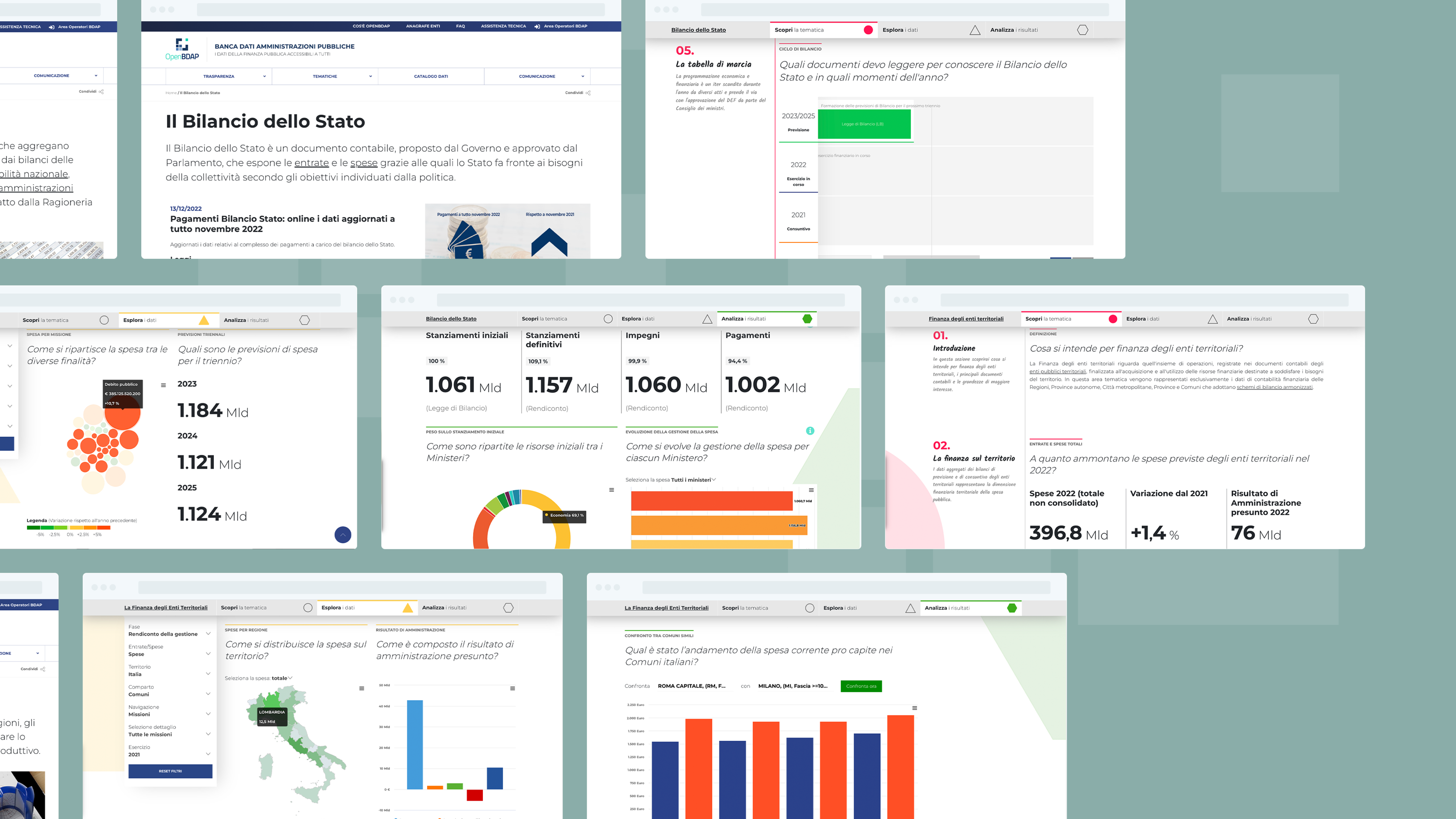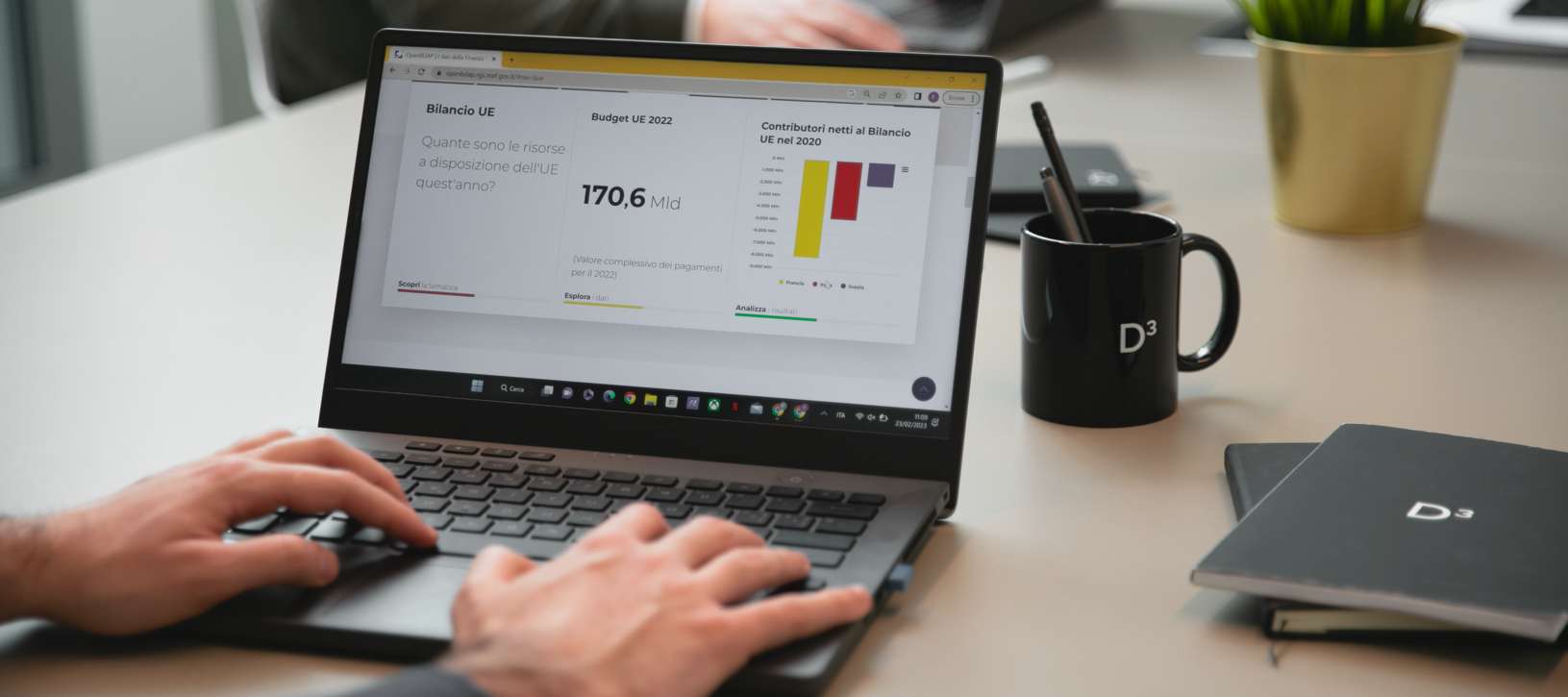THE STARTING POINT
Creating a new data access point
OpenBDAP is the acronym for the Open Data Information Platform of the Public Administration Database. It is a project that stems from a desire for openness, transparency and dialogue with citizens, which is at the heart of the actions of the Ragioneria dello Stato (RGS).
OpenBDAP is part of an important digital transformation moment for RGS, and has two intentions
- to develop and update information systems with the introduction of new consultation models;
- to create an access point to the accounting and public finance data of the Ministry of Economy and Finance.
Among the main objectives of OpenBDAP is the need to ensure new and standardised understanding and access models for different types of citizens, who have different levels of preparation and information needs, and show interest in economic matters on a national scale.
THE STARTING POINT
Creating a new data access point
OpenBDAP is the acronym for the Open Data Information Platform of the Public Administration Database. It is a project that stems from a desire for openness, transparency and dialogue with citizens, which is at the heart of the actions of the Ragioneria dello Stato (RGS).
OpenBDAP is part of an important digital transformation moment for RGS, and has two intentions
- to develop and update information systems with the introduction of new consultation models;
- to create an access point to the accounting and public finance data of the Ministry of Economy and Finance.
Among the main objectives of OpenBDAP is the need to ensure new and standardised understanding and access models for different types of citizens, who have different levels of preparation and information needs, and show interest in economic matters on a national scale.
THE STRATEGY
Tackling complexity, layer by layer
From product conception to information architectures, from user experience to the development of application solutions, at the core of each phase the project posed a precise question: “how to make people understand what Public Finance really is?”.
An agile and context-aware answer was given to this question. Alongside it, however, were further problems:
- simplifying an extremely complex subject;
- translating it for different target audiences;
- defining a project to bring together and actively involve different stakeholders, interpreters of the thousand souls of the State Budget and the issues with which it relates.
The project therefore required a very in-depth analysis of the scenario, given its inherently ambitious nature, the implicit repercussions on taxonomies and classifications, and the issues relating to organisation, consultation and interaction with data and information.
Stimulating the conversation with the public and the citizen
Simplifying the complexity was one of the prerequisites for the next, even more important question: who are, what do they expect and what do they want to know from the people to whom
the project is aimed at?
This system was designed as a platform capable of bringing citizens and the public together in a different way and reaching the widest possible audience. To do so, however, it had to measure itself against a composite and heterogeneous target audience.
It is an audience ranging from citizens who want to be informed about the facts and dynamics of public finance – thanks to a qualified source – to specialists interested in the availability of analytical, certified data that can be consulted through the support of additional analysis platforms.
The project was immediately based on some of the founding values of the RGS Institution: to support citizens in their approach to and contact with a true information democracy, capable of promoting and supporting knowledge and awareness with reliable data, and through a tool created on the principles of the widest transparency.
Structuring the Portal around 3 main axes
The OpenBDAP project adopts an organisation of content by thematic areas, which present different keys to interpreting the phenomena of accounting and public finance; the navigation paths, uniform and transversal to the different thematic areas, are designed to guide the user through multiple levels of in-depth analysis, suggesting access to information according to the level of knowledge he/she wishes to develop and starting from 3 different dimensions of in-depth analysis:
- discover the topic, for those who want to know the main characteristics and dimensions of the topic. For example: the user discovers how much revenue and expenditure is in the State Budget.
- explore the data, for those who want to delve into the data with interactive tools and consultation systems that can be configured according to their needs. For example: the user can explore how public investments are distributed between state and local government.
- analysing results, which provides experts and insiders with data from which to derive more in-depth and detailed analyses for free processing and research. For example: the specialist can download datasets on the cash receipts of public administrations.

Feeding the tool and relationships
The result of this process is tangible.
A vast amount of accounting and public finance data is now available for all to use, based on the expertise, culture and practices of the institution that manages and licenses it.
OpenBDAP is available in an open format, which can be consulted in a clear, transparent and accessible manner.
OpenBDAP is also a progressively enriching project. The Portal is the only web tool for sharing RGS accounting and public finance data with the community. Since it went online, new projects and content have been added, strengthening this channel and opening it up to further information proposals.
Among these is “I Quaderni del Portale”, a new official editorial publication of the Ragioneria Generale dello Stato, designed to provide its audience with further thematic insights for study and research consultation.
The OpenBDAP project, a direct manifestation of RGS’s information strategy, strengthens its desire for dialogue and exchange with all State functions (such as Government and Parliament) that base their communication on the transparent dissemination of economic-financial data.
THE CHANGES AND BENEFITS
Improving the relationship between citizen and state with Open Data
OpenBDAP is a sophisticated and accessible ecosystem. It allows different Systems, Organisations and people to find and cross-reference databases.
From the Portal one can access the RGS Open Data Platform, within which the user can find “open” datasets, navigable in tabular form, modifiable and downloadable in the formats proposed by the AgID guidelines.
Open Data can be freely used, reused and redistributed by anyone, on the basis of two interconnected principles: universal participation (all people must be able to use them, without any discrimination) and interoperability (data can be exchanged).
In this way, OpenBDAP transforms the comparison and the possibility of communicating results of free surveys into the cornerstone of a new relationship between people and state, to make the citizen informed.
Experience of change
The OpenBDAP project touches on a fundamental theme: it is a project based on the encounter of cultures, languages and models to strengthen RGS’s vision of knowledge opportunities for the community, thanks to a new open, secure and authoritative environment.
New and better services to the community are the result of the organisation’s readiness to get involved, establish contacts and open up to conversations as never before.
This willingness is a great responsibility.
Working with each and every piece of data, information and experience, pushes the organisation’s identity to emerge in the forms required today, communicating transparency, releasing untapped resources, to generate new value.
This is the lesson that a great Institution like RGS can teach.
